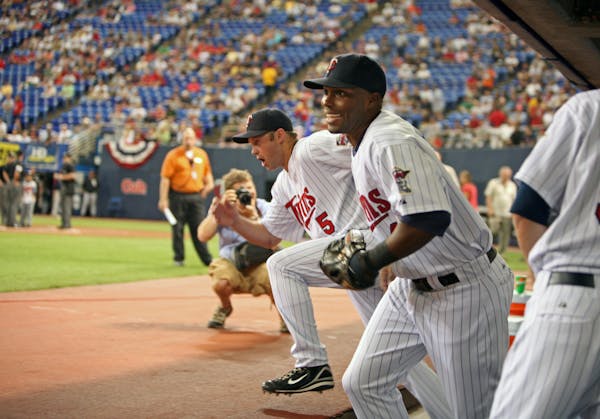As Torii Hunter spent recent seasons with playoff-worthy teams in Los Angeles and Detroit, he knew his career would circle back to the Twin Cities.
"You talk about true love,'' Hunter said. "That's the Twins right there.''
After talking to several teams, including the Rangers, Hunter agreed to a one-year, $10.5 million contract, pending a physical. Hunter will be in the Twin Cities either Wednesday or Thursday for that exam, with the club making the deal official as soon as he passes. And that's expected to be a formality.
So the five-time All-Star, nine-time Gold Glove winner and fan favorite will try to prove at age 39 that he has the Ponce de Leon thing figured out while helping to change the culture of a Twins club that has bottomed out with four consecutive seasons of at least 92 losses.
The Twins are trying to rebuild without saying they are rebuilding. They have promising young hitters in Danny Santana, Kennys Vargas and Oswaldo Arcia. But they have a pitching staff that needs some major remodeling.
But, while playing for the Tigers the past two seasons, Hunter has faced the Twins enough to believe that they can turn the corner.
In 11 seasons with the Twins, Hunter batted .271 with 192 home runs and 711 RBI. His most productive season was his final year in 2004, when he batted .287 with 28 home runs and 107 RBI. The Twins went from being the doormat of the AL Central to winning six division titles during the 2000s.
"In 2002, our team wasn't as talented as the team they have today,'' Hunter said. "We had the mentality and the attitude to go out and fight you every day. We were heartless, and we played together.
"They have the talent. They just need that fight, that willingness and that hunger. I think they can win next year.''
Hunter last played for the Twins in 2007 before leaving to sign a five-year, $90 million contract with the Angels. He spent the past two seasons with Detroit. He batted .286 last season with 17 home runs and 83 RBI. He thinks he'll play right field for the Twins but is willing to play left if needed. Hunter must prove he won't be a liability in the field, as defensive metrics suggest he has slipped to below average in recent years.
The Twins had to win a battle to land Hunter, as a bunch of teams, including Kansas City, Baltimore, Cincinnati, Texas and Atlanta, expressed interest.
The Rangers offered a year plus an option, which tempted Hunter because he lives nearby in Prosper, Texas.
With input from his wife, Katrina, Hunter decided to return to the team he broke into the majors with and became a star.
"Katrina was like, 'It's time to come home [to Texas] and be home more,'' Hunter said, "but when the Twins came up, she was like. 'I can go there, too.' "
Twins manager Paul Molitor and bullpen coach Eddie Guardado — Hunter's teammate from 1997-2003 — were among Twins personnel working on Hunter to return.
It certainly helped that Molitor, whom Hunter referred to as a mentor, was aggressive and up front with him.
"Molly called several times,'' Hunter said. "We had good conversations. He's a stand-up man. And he said we can win.''
Arbitration players get offers
The Twins tendered contracts to all of their arbitration-eligible players, according to two sources.
The Twins tendered contracts before the 11 p.m. deadline Tuesday set by the league. The Twins can now try to sign those players to avoid arbitration, or settle in hearings.
The Twins had to make decisions on third baseman Trevor Plouffe, lefthanders Tommy Milone and Brian Duensing, outfielder Jordan Schafer, infielder Eduardo Nunez and righthander Casey Fien.
